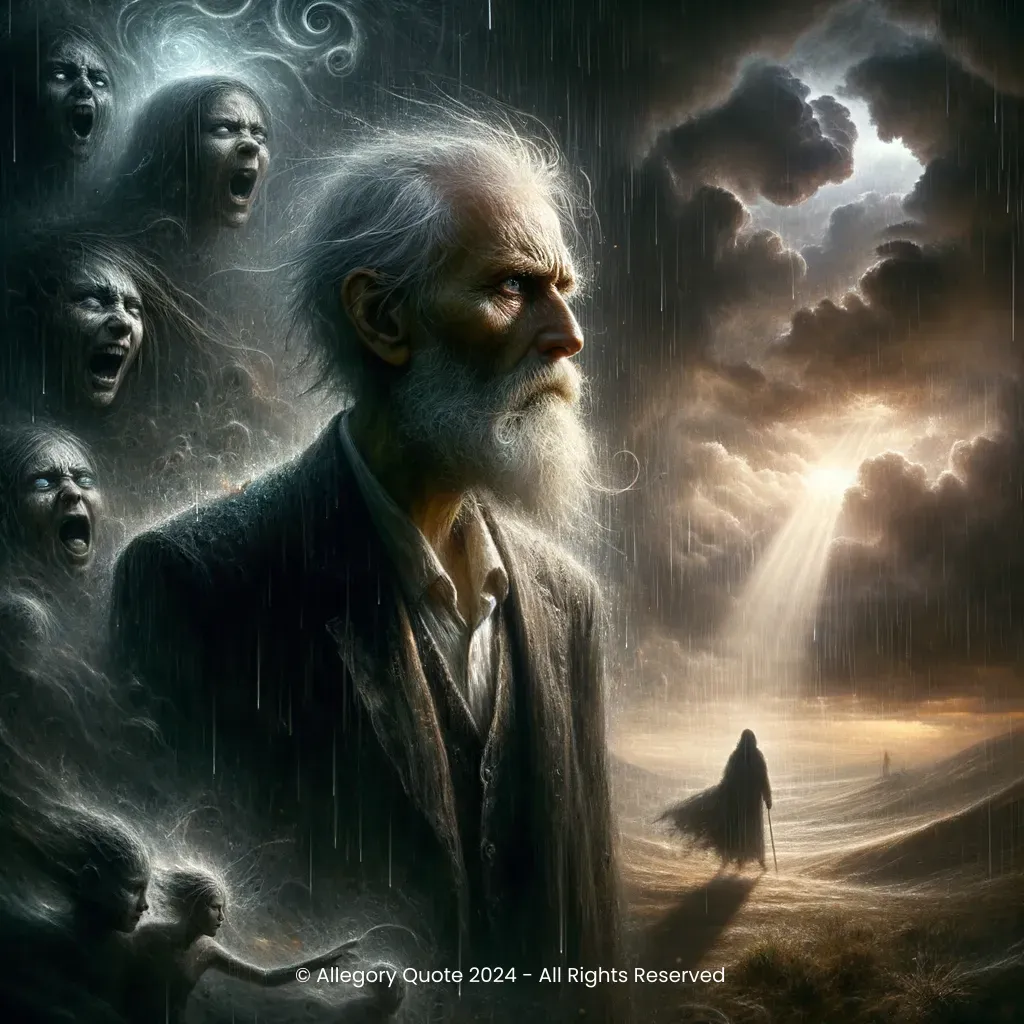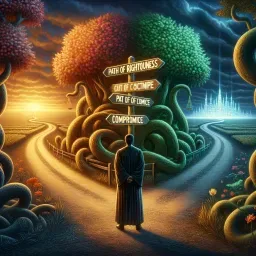I am a man more sinned against than sinning

0
0
0
0
- Meaning
- This phrase speaks to the feeling of being wronged or victimized more than being guilty of wronging others. King Lear utters these words while he is experiencing profound suffering and betrayal by his daughters. The phrase resonates deeply with the themes of injustice and the human tendency to perceive oneself as a victim of circumstances beyond one's control. It highlights the complex interplay between guilt, blame, and the search for empathy from others.
- Allegory
- King Lear's weathered face and desperate expression embody the suffering and perceived victimization. The stormy wilderness symbolizes the tumultuous emotional and psychological state he is in. The shadowy figures of his daughters represent betrayal and the source of his anguish. The beam of sunlight in the distance signifies hope, redemption, and the possibility of eventual clarity and justice, while also reminding viewers of the resilience of the human spirit amid adversity.
- Applicability
- In daily life, this phrase can be a reminder to reflect on personal accountability and the tendency to blame others for one's hardships. It encourages introspection and empathy, urging individuals to examine their roles in various situations objectively. It can also serve as a call for compassion towards those who genuinely feel wronged, promoting understanding and support.
- Impact
- This phrase has had a significant cultural impact, often cited in discussions of justice, victimization, and self-perception. It has been used in various literary and philosophical contexts to explore the nature of sin, punishment, and moral responsibility. Its resonance with feelings of injustice continues to make it relevant in contemporary discourse.
- Historical Context
- King Lear was written around 1605-1606 and is set in a mythical prehistoric Britain. The play itself reflects the political and social turmoil of Shakespeare's time, touching on themes of power, legitimacy, and familial duty. This historical context emphasizes the timeless nature of human suffering and the complexities of moral judgment.
- Criticisms
- One criticism of the phrase could be its potential to absolve individuals of personal responsibility by framing oneself solely as a victim. It can be argued that everyone has the capacity to sin and victimize others, and thus, self-pity might mask one's own faults and the need for personal growth.
- Variations
- Variations of this phrase may appear in different cultural contexts, often reflecting local attitudes towards sin, justice, and victimization. For instance, in Japanese culture, the concept of karma and accountability for one's actions is often emphasized, though the sentiment of feeling wronged more than being wrong remains universal.
-

To weep is to make less the depth of grief.
-

I must be cruel, only to be kind.
-

Some rise by sin, and some by virtue fall.
-

To do a great right, do a little wrong.
-

To do a great right do a little wrong.
-

There is nothing either good or bad but thinking makes it so.
-

If to do were as easy as to.
-

When sorrows come, they come not single spies, but in battalions.
-

know what were good to do, chapels had been churches, and poor men's cottages princes' palaces.
-

Good night, good night! Parting is such sweet sorrow.
-

Things without all remedy should be without regard: what's done is done.
-

To be, or not to be, that is the question.
No Comments